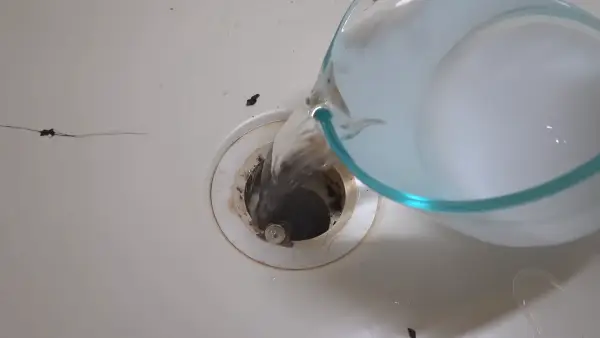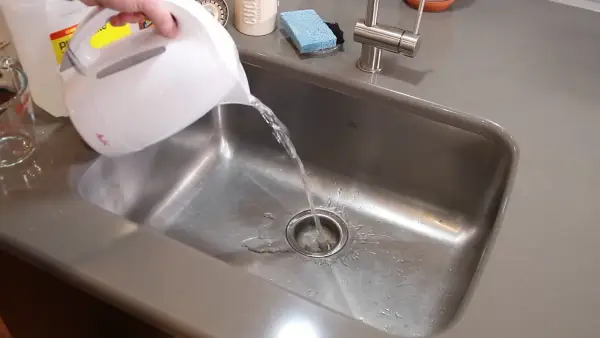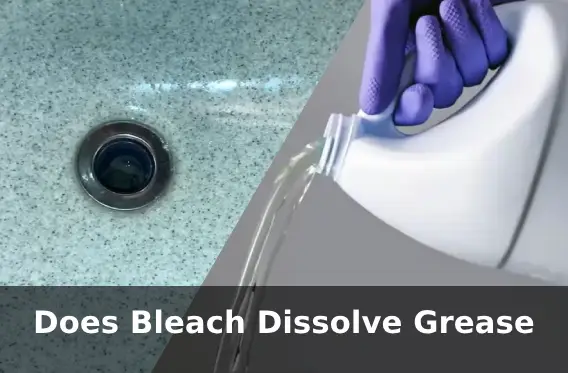Last Updated on November 14, 2023
Grease buildup in kitchen sinks is a common household nuisance that can lead to slow drains and plumbing issues. Your sink also risks becoming a breeding ground for bacteria and other organisms. Without a proper cleaning solution, the sink can become a health hazard.
Now, you want to know if bleach dissolves grease to clean your kitchen sink effectively.
While you may consider using bleach as a solution, you should note that bleach is not the most effective or safe option for dissolving grease in sink drains. It can lead to a buildup of hazardous materials in the drain and even corrode the plumbing pipes.
Here, we will analyze why bleach may not be your best option to dissolve grease in the sink and discuss alternative methods for tackling this greasy dilemma.
Why Don’t You Use Bleach to Dissolve Grease in the Sink?

Bleach is a kind of chlorine-based chemical solution that works as a disinfectant and bleaching agent. Its ability to break down organic matter, such as grease, is limited. Here are a few reasons why using bleach to dissolve grease in the sink is not ideal:
- Reason 01: Ineffectiveness
- Reason 02: Potential damage to plumbing
- Reason 03: Safety concerns
- Reason 04: Environmental impact
Reason 01: Ineffectiveness
Since bleach isn’t formulated to break down or dissolve grease effectively, it’s ineffective for removing grease in the sink. Bleach’s primary function is disinfection and stain removal, not grease removal.
Grease is a hydrophobic substance that repels water, and bleach is mostly water-based. As a result, bleach lacks the necessary chemical properties to emulsify and dissolve grease.
The molecular structure of grease consists of long hydrocarbon chains, which aren’t easily broken down by bleach. Also, bleach’s alkaline nature may cause grease to solidify and form clumps, making removing it even more difficult.
Reason 02: Potential Damage to Plumbing
Using bleach to dissolve grease in your kitchen sink can damage your plumbing system and lead to costly repairs.
Bleach is a corrosive substance that can weaken pipes, sinks, and rubber gaskets over time. When bleach comes into contact with grease, it may create a chemical reaction that produces heat, further deteriorating the plumbing components.
The corrosive properties of bleach can eat away at the interior lining of pipes, causing them to become weak and prone to leaks. Also, the rubber gaskets that seal the connections between pipes can deteriorate and fail when exposed to bleach.
Reason 03: Safety Concerns
You should know the safety concerns when dissolving grease with bleach. With its potent chemical properties, bleach can be hazardous if not handled cautiously.
Bleach can splash or release toxic fumes when it comes into contact with drain contaminants, including residual cleaning products. This poses a safety hazard to anyone in the vicinity.
Reason 04: Environmental Impact
To avoid harming the environment, you should consider the environmental impact of using bleach to dissolve grease in your kitchen sink. While bleach is commonly used as a cleaning agent, it can have detrimental effects when disposed down the drain.
When a high amount of bleach reacts with other chemicals in wastewater, it can form harmful compounds that are harmful to aquatic ecosystems. Also, bleach isn’t eco-friendly and can contribute to water pollution when released into water bodies.
Therefore, exploring alternative methods to dissolve grease in your kitchen sink that are more environmentally friendly is crucial.
How Do You Dissolve Grease in a Kitchen Sink Without Bleach?
You can use liquid dish soap and hot water to dissolve grease in a kitchen sink with liquid dish soap & hot water, vinegar & baking soda, rubbing alcohol, and other cleaners. Let’s break down how these methods can be effective:
No 01: Liquid Dish Soap and Hot Water
Combining liquid dish soap and hot water is a powerful solution for dissolving grease in a kitchen sink.
The dish soap acts as a surfactant, breaking down the surface tension of the grease and allowing it to mix with the water. This emulsification process allows the grease to be easily washed away.
The hot water further enhances this process by increasing the temperature of the grease, making it more fluid and easier to dissolve. The heat also helps to loosen the bonds between the grease molecules, aiding in its removal.
No 02: Vinegar and Baking Soda
Using vinegar and baking soda, you can effectively dissolve grease in your kitchen sink without bleach. This natural and safe cleaning solution creates a chemical reaction between the baking soda and vinegar.
Vinegar is known for its acidic properties, which help to dissolve grease and grime. On the other hand, baking soda acts as a natural abrasive, removing stubborn grease. Together, these two ingredients make a powerful and effective solution for clearing your kitchen sink of grease without bleach.
No 03: Rubbing Alcohol
In addition to breaking down grease stains, rubbing alcohol is also known as isopropyl alcohol. The alcohol molecules have a polar structure, allowing them to attract and dissolve the nonpolar grease molecules.
As the rubbing alcohol sits in the drain, it penetrates the grease, weakening its structure and making it easier to remove. Once the alcohol has had time to work its magic, run hot water down the drain to flush away the dissolved grease.
No 04: Commercial Grease-Cutting Cleaners
Try using a commercial grease-cutting cleaner to dissolve grease in your kitchen sink effectively. These cleaners are designed to break down grease and other organic materials that can clog your drains.
They use powerful chemicals that break down the grease into smaller particles, making it easier to wash away. Follow the instructions provided by the manufacturer carefully to ensure the best results.
No 05: Plumbing Snake or Auger
Using a plumbing snake or auger is an effective way to break up and remove grease clogs like other waste in your kitchen sink. These tools are designed to physically break apart the grease blockage, allowing it to be easily removed.
But you should note that if you have a garbage disposal unit under your sink, you shouldn’t use a plumbing snake or auger. Instead, opt for other methods, such as using a plunger or following the manufacturer’s instructions for the disposal unit.
What happens if I pour bleach and vinegar down the kitchen sink drain?

Occasionally, mixing bleach and vinegar down your kitchen sink drain can produce harmful gasses. When bleach and vinegar are combined, they create chlorine gas and water. The chlorine gas can cause respiratory problems, eye irritation, and even lung damage if inhaled in high concentrations.
Also, the gas can react with other substances in the drain, such as ammonia or organic matter, to produce toxic compounds. This can further exacerbate the health risks.
Keeping Your Sink Grease-Free Without Bleach
Maintaining a free-flowing kitchen sink doesn’t have to involve harsh chemicals like bleach. The alternative cleansers discussed in this article offer safe and environmentally friendly ways to dissolve grease and prevent clogs in your sink drains.
Use natural and safe ingredients, such as baking soda and vinegar, and break down grease without causing any harm to your pipes or the environment.
So, ditch the bleach and opt for a more eco-friendly solution next time you’re faced with a greasy sink.

